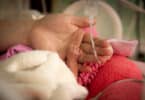
All new moms receive an Oxytocin injection after delivering a baby to avoid dangerous complications arising due to pregnancy. But many women in developing countries cannot get this vital injection as they do not have access to proper medical care, may get counterfeit versions or may not store the drug properly as it needs refrigeration.
To help these women Monash Institute of Pharmaceutical Sciences (MIPS) in Australia is developing an inhalable version of the same drug. The institute received a grant of $964,000 for the project.
Speaking to Herald Sun about the drug Dr Michelle McIntosh said,
“Oxytocin is used in the active management of the third stage of labor after the baby is born and before the placenta is delivered. The World Health Organization recommends that every single woman is given an injection to help with uterine muscle contraction and to prevent excessive bleeding.”
Experts believe that a woman dies of postpartum hemorrhaging every three minutes. Worldwide 150,000 women die annually due to post labor complications. The drug in its inhalable form will thus ensure that more moms get access to it without storage problems. It can be used in a nasal spray form or an inhaler, similar to an asthma puffer.
Dr McIntosh says that the drug is being developed for women of developing nations but it can be easily used by women living in remote parts of Australia and midwives assisting women with home births.
The doctors are now testing the shelf life of the product and will begin clinical trials on moms by next year.






